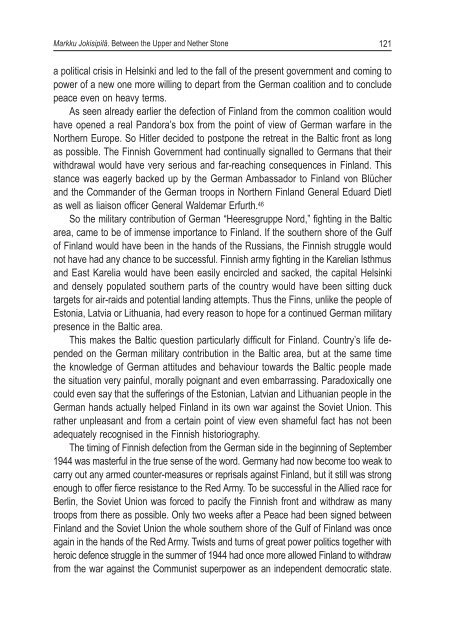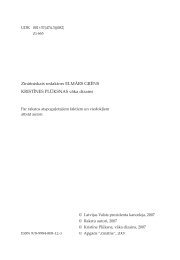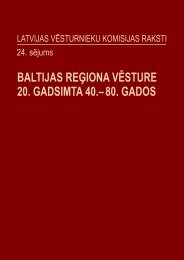15.sējums - Valsts prezidenta kanceleja
15.sējums - Valsts prezidenta kanceleja
15.sējums - Valsts prezidenta kanceleja
You also want an ePaper? Increase the reach of your titles
YUMPU automatically turns print PDFs into web optimized ePapers that Google loves.
Markku Jokisipilä. Between the Upper and Nether Stone<br />
a political crisis in Helsinki and led to the fall of the present government and coming to<br />
power of a new one more willing to depart from the German coalition and to conclude<br />
peace even on heavy terms.<br />
As seen already earlier the defection of Finland from the common coalition would<br />
have opened a real Pandora’s box from the point of view of German warfare in the<br />
Northern Europe. So Hitler decided to postpone the retreat in the Baltic front as long<br />
as possible. The Finnish Government had continually signalled to Germans that their<br />
withdrawal would have very serious and far-reaching consequences in Finland. This<br />
stance was eagerly backed up by the German Ambassador to Finland von Blücher<br />
and the Commander of the German troops in Northern Finland General Eduard Dietl<br />
as well as liaison officer General Waldemar Erfurth. 46<br />
So the military contribution of German “Heeresgruppe Nord,” fighting in the Baltic<br />
area, came to be of immense importance to Finland. If the southern shore of the Gulf<br />
of Finland would have been in the hands of the Russians, the Finnish struggle would<br />
not have had any chance to be successful. Finnish army fighting in the Karelian Isthmus<br />
and East Karelia would have been easily encircled and sacked, the capital Helsinki<br />
and densely populated southern parts of the country would have been sitting duck<br />
targets for air-raids and potential landing attempts. Thus the Finns, unlike the people of<br />
Estonia, Latvia or Lithuania, had every reason to hope for a continued German military<br />
presence in the Baltic area.<br />
This makes the Baltic question particularly difficult for Finland. Country’s life depended<br />
on the German military contribution in the Baltic area, but at the same time<br />
the knowledge of German attitudes and behaviour towards the Baltic people made<br />
the situation very painful, morally poignant and even embarrassing. Paradoxically one<br />
could even say that the sufferings of the Estonian, Latvian and Lithuanian people in the<br />
German hands actually helped Finland in its own war against the Soviet Union. This<br />
rather unpleasant and from a certain point of view even shameful fact has not been<br />
adequately recognised in the Finnish historiography.<br />
The timing of Finnish defection from the German side in the beginning of September<br />
1944 was masterful in the true sense of the word. Germany had now become too weak to<br />
carry out any armed counter-measures or reprisals against Finland, but it still was strong<br />
enough to offer fierce resistance to the Red Army. To be successful in the Allied race for<br />
Berlin, the Soviet Union was forced to pacify the Finnish front and withdraw as many<br />
troops from there as possible. Only two weeks after a Peace had been signed between<br />
Finland and the Soviet Union the whole southern shore of the Gulf of Finland was once<br />
again in the hands of the Red Army. Twists and turns of great power politics together with<br />
heroic defence struggle in the summer of 1944 had once more allowed Finland to withdraw<br />
from the war against the Communist superpower as an independent democratic state.<br />
121









